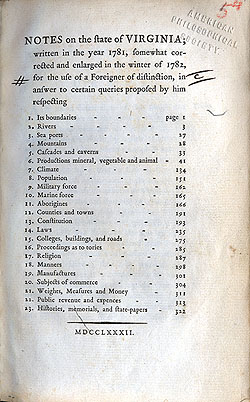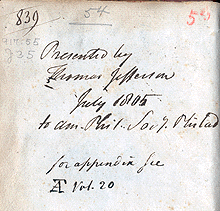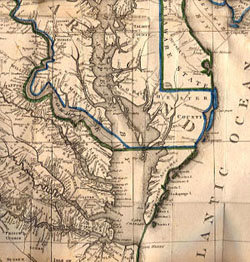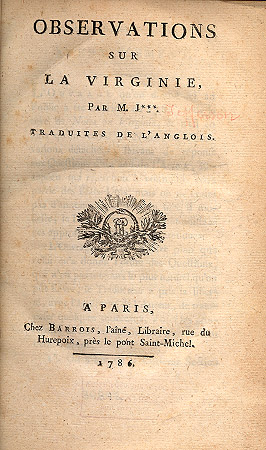 |
Title page of first (private) edition of Notes on the State of Virginia
(click to read about beasts) |
No American natural history was more influential during the 18th century than Thomas Jefferson's (1743-1826)
Notes on the State of Virginia, though it is, as intended, far more than a simple natural history. At once a description of the land and people of the state and a theoretical discourse on historical, natural, and political systems, the
Notes represents Jefferson's conflicted views on the present and future of the new American nation, an integral mix of hope and anxiety.
Jefferson's Notes began inauspiciously during the late autumn, 1780, when François de Barbé Marbois, the secretary of the French legation to the United States, sent a set of standard queries to American officials to elicit information about the thirteen states. Queries like Marbois' were a common means for colonial administrators to familiarize themselves with the historical, political, demographic, and economic situations of their constituencies -- a sort of bureaucratic approach to information gathering -- and Marbois may have intended to write his own study of the states. But when the queries he had sent to Joseph Jones, a congressman from Virginia, were forwarded to Jefferson, the response was anything but common.
 |
John Vaughan's note written inside the cover,
stating "gift of the author" |
From a certain perspective, the timing of Marbois' request could not have been worse. On the very day that he confirmed receipt of the queries, Jefferson's wife, Martha, nearly died giving birth to her fifth child, and less than a month later, Virginia was invaded by British forces under the command of Benedict Arnold. As governor, Jefferson was forced to improvise the state's limited defenses to blunt an unusually savage campaign, and the results were not encouraging. The defining moment came on June 4, 1781, when troops under Banastre Tarleton entered Charlottesville and nearly captured Jefferson at home. In his memoir, Tarleton sarcastically observed that Jefferson escaped having "discovered the British dragoons from his house, which stands on the point of a mountain, before they could approach him, and he provided for his personal liberty by a precipitate retreat." To add insult to injury, eight days later, the House of Delegates launched an investigation into whether his conduct constituted negligence of duty.
 |
| Map of Chesapeake Bay and Eastern Virginia |
Throughout this
annus terribilis, Jefferson returned periodically to Marbois' queries. Having complained in March, 1781, that his "present occupations" prevented him from collecting the necessary information, on December 20th, he sent a preliminary set of answers to both Marbois and Charles Thomson of the American Philosophical Society. He was less than satisfied with the product, but resigned to test Marbois' patience no further. "Even now," he complained, "you will find them very imperfect and not worth offering but as a proof of my respect for your wishes."
Although exonerated of negligence by the House of Delegates, Jefferson's lot did not improve. Following the difficult birth of their sixth child in May, 1782, Martha languished and in September, died. Although crushed by the loss, Jefferson returned seriously to Marbois' queries during the ensuing months and continued while serving in the Virginia House of Delegates in 1783-1784. Although reluctant to let go of the project, by January, 1784, the clamor to see the manuscript had grown so great that he informed the Marquis de Chastellux that he intended to print up "a dozen to 20 copies to be given to my friends, not suffering another to go out." The cost of American printing, however, was so high that the publication did not actually appear until after he was appointed Minister Plenipotentiary to France on May 7, 1784. In France, he claimed, the work could be printed for only a quarter of what it cost in America, and he therefore had two hundred copies of the Notes on the State of Virginia printed privately by Philippe-Denis Pierres on May 10, 1784, though dated 1782. A few were distributed in Europe, the remainder at home.
 |
| Title page of first Barrois edition of Observations sur la Virginie |
As was always the case with Jefferson, his private offering did not long remained private. A copy of the work -- probably the one given to Jefferson's vexing friend, Williamoz, fell into the hands of a French publisher, Louis François Barrois, intent on producing an unauthorized translation. Although the Abbé François Morellet intervened to provide a correct translation, his tendency to translate in a literary manner -- fusing his own opinions with those of the author -- only irritated Jefferson further. In Jefferson's words, the result was "so wretched an attempt at translation" that he could not abide it. The man who quivered at the corrections foisted on his Declaration of Independence by an unsympathetic Congress was in high dudgeon: "Inverted, abridged, mutilated, and often reversing the sense of the original," he moaned, "I found it a blotch of errors from beginning to end." With pages of emendations and Jefferson's insistent assistance, the work appeared in 1786. The opportunity to fully right the wrongs done to his text came the next year, when John Stockdale, the London publisher, issued the first, publicly offered English language edition. Nevertheless, in later years, Jefferson considered the Pierres edition, "the only one almost perfectly correct." All others paled.
The APS owns several editions of Jefferson's Notes, beginning with the privately printed Paris edition of 1784, given by Jefferson to the APS in 1805, the French language edition of Barrois (1786), the first English edition by Stockdale (1787), and early American editions published in Philadelphia by Prichard and Hall (1788), Mathew Carey (1794), in New York by M.L. and W.A. Davis (1801) and in Trenton by Wilson and Blackwell (1803).




